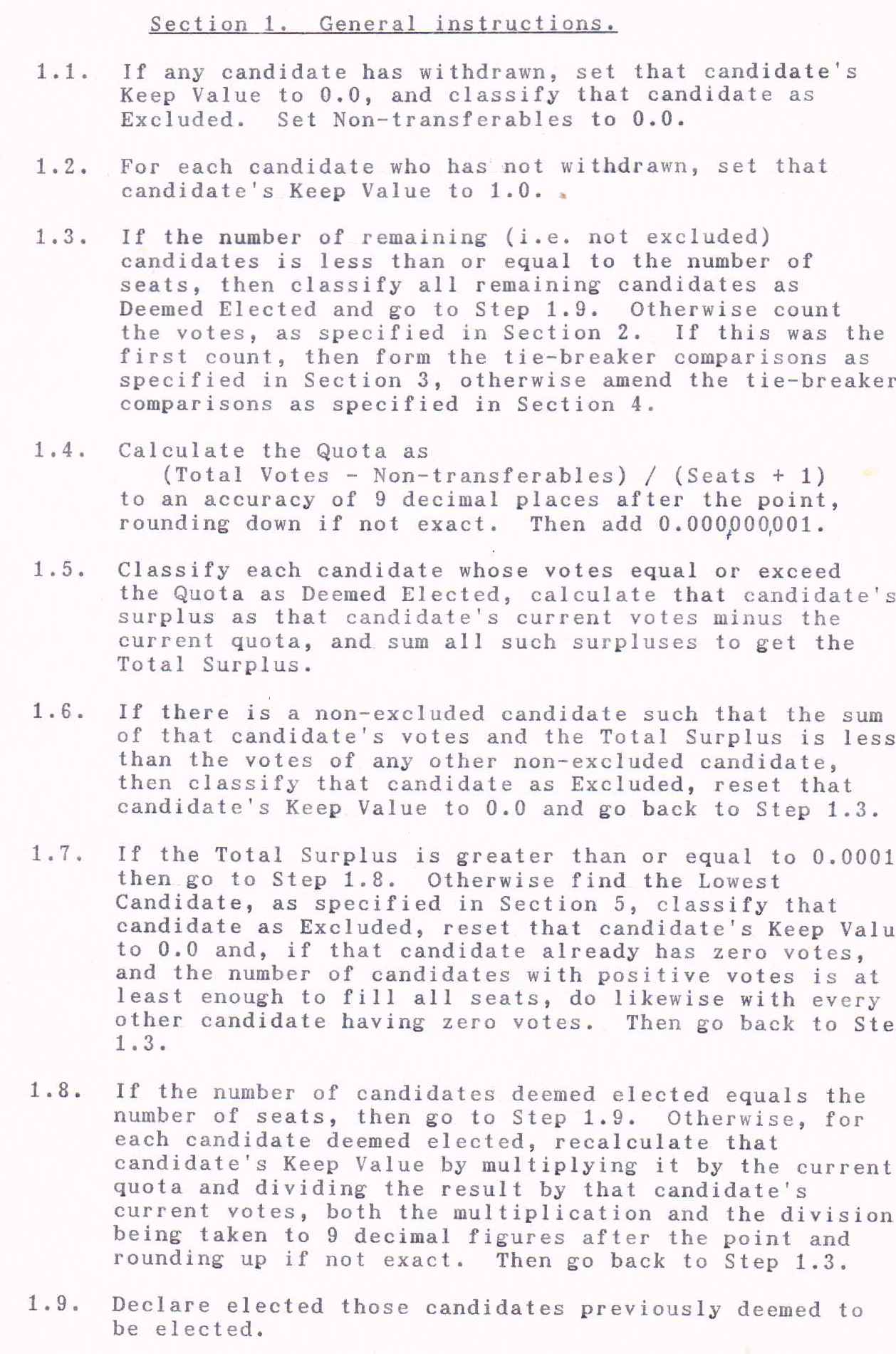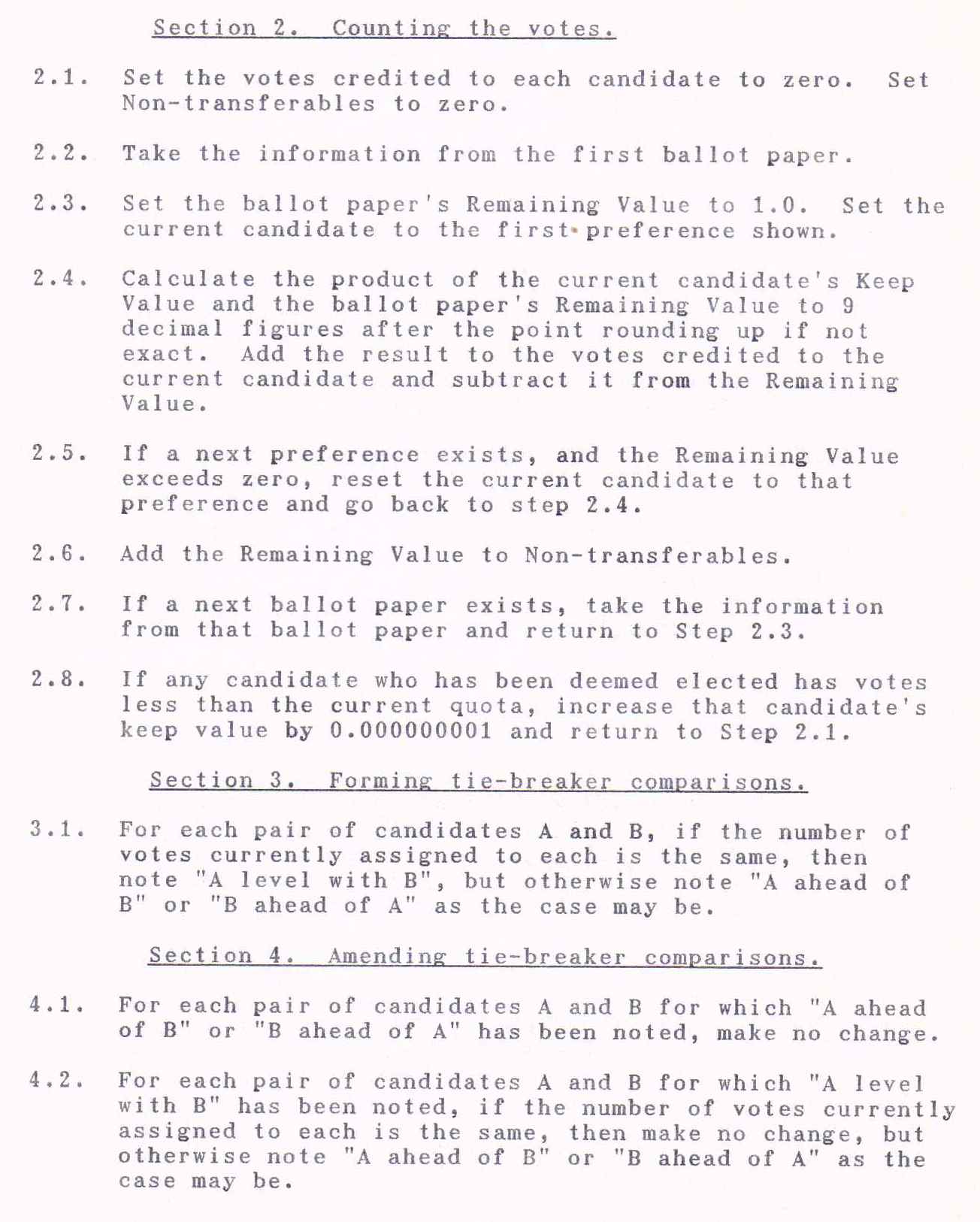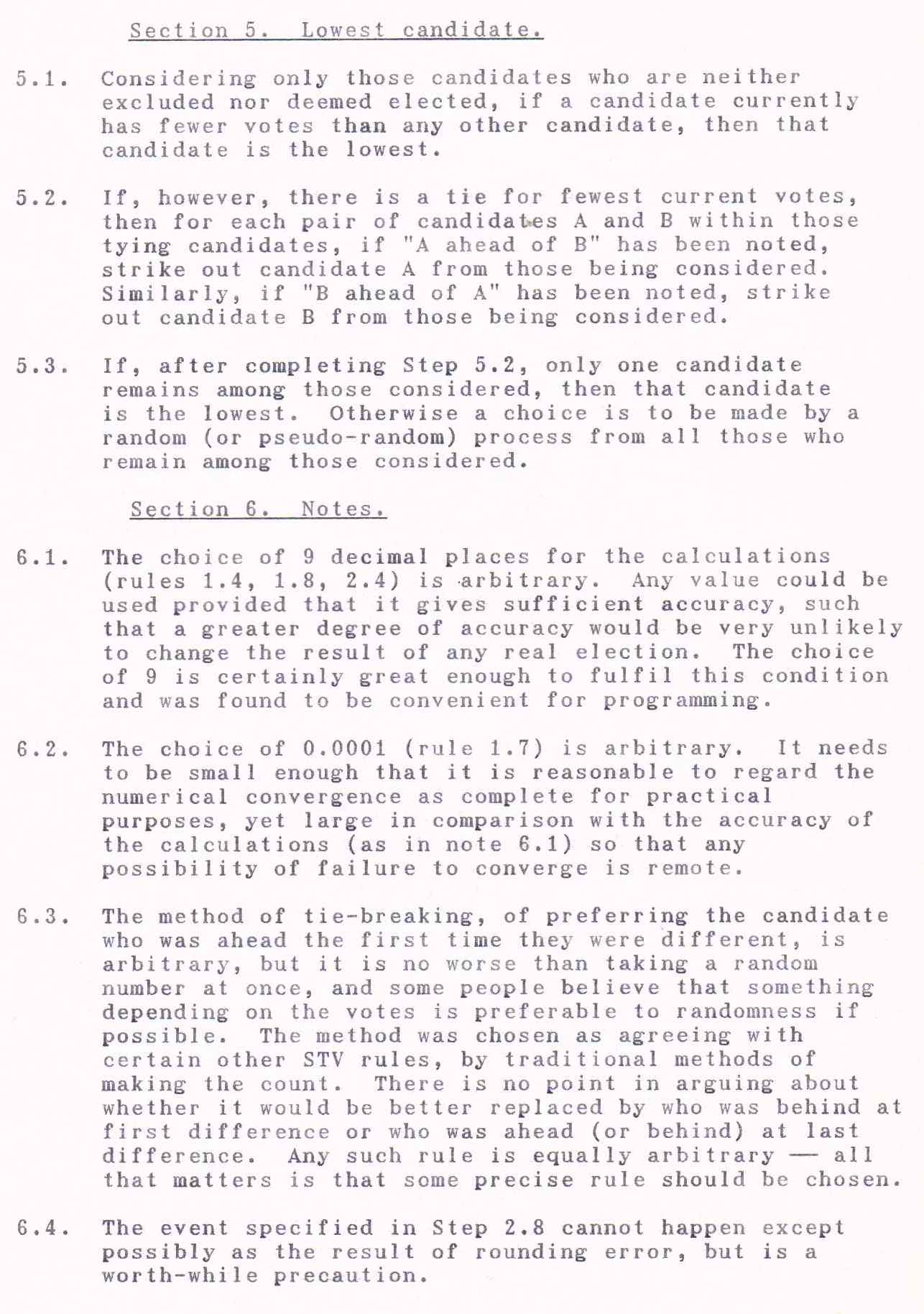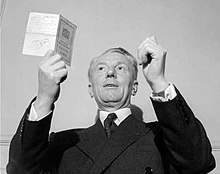|
|
Post by johnloony on May 11, 2022 17:02:57 GMT
To avoid cluttering up the Scottish elections thread, here is a thread specifically about STV and other such anoraky geeky contrafibularities. Not sure if this has been posted before, but I found a rather interesting site with the 2017 results calculated using the Meek method of STV instead of the current Gregory Method. I am not qualified enough to explain the difference, other than the fact that Meek is supposedly fairer, but also even more complicated. www.macs.hw.ac.uk/~denis/stv_elections/SC2017meek/index.htmlI know exactly how the Meek method works. I don’t know exactly what the differences are between the Gregory method and the Newland-Brittan method, except that they are very similar. I have found a concrete example where this makes a difference - St. Andrews in Fife. LD +1, Lab -1. I am as geeky as anyone when it comes to elections, but I don't understand why some-one elected over quota has their vote gradually reducing through later stages. Is the Meek system designed to punish voters who don't use their transfers? The Gregory system seems intuitive. How would a Meek enthusiast explain "some votes have transferred from candidate A to candidate B, so we take some votes off candidate C"? Is the Meek method something to do with the late Brian Meek - longstanding Edinburgh Conservative councillor? I think he was an STV enthusiast? Yes - I have just spent about an hour going through my (very large) pile of papers from my 20 years as a member of the Electoral Reform Society, and I have found the detailed instructions for how to conduct a count by the Meek system of STV. I will scan it and load it up later, when I have time. But the essential features of the Meek system (compared with the Newland Brittan, or Gregory system) are as follows: 1. It is too complicated to count by hand; it has to be counted by computer. 2. Transfer the surpluses from all elected candidates at the same time, to the next preference (not the next available preference). This means that some elected candidates will receive some of the surpluses from other elected candidates. 3. Reduce the value of the votes of the elected candidates by the appropriate fraction, so that they can be reduced to the quota. 4. Re-calculate the quota at each stage, in order to take into account the number of non-transferable votes. 5. When you transfer the surplus of an elected candidate, transfer the same fractional value of all the bundles of votes which that candidate has, not just the most recently received bundle which created the surplus. Stage 3 (transferring the surpluses of elected candidates to each other) can go around and around a few times before they are small enough to get to the next stage of eliminating the bottom candidates. This means that the number of counts in an STV election by the Meek method can be very many more than the number of candidates, whereas in a Newland Brittan count, the maximum number of rounds of the count is one less than the number of candidates. When I first joined ERS in 1995, the big internal argument which was going on within the society was whether to use the Newland Britain method, or whether to use the Meek method. The geeks and anoraks within the society got very het up about it. One of the main advocates of using the Meek method was the late Dr David Hill. The Meek fanatics succeeded in persuading the ERS to change the rules to allow for the ERS Council of 15 members to be elected by the Meek method one year. The result of that election was that 15 people were elected, and Dr Hill lost his seat. When, just out of curiosity, the same ballot papers were counted according to the Newland Britain method, the only difference was that Dr Hill would have been elected, alongside 14 of the same 15 people. Doctor Hill was such a purist in believing in the Mick system that he was perfectly happy with this ironic outcome. In his view, the correct system had been used, even though he was the one which lost out. The following year, ERS switched back to using the Newland Brittan method, and has never used meet again. I have found a concrete example where this makes a difference - St. Andrews in Fife. LD +1, Lab -1. I am as geeky as anyone when it comes to elections, but I don't understand why some-one elected over quota has their vote gradually reducing through later stages. Is the Meek system designed to punish voters who don't use their transfers? (1) The Gregory system seems intuitive. How would a Meek enthusiast explain "some votes have transferred from candidate A to candidate B, so we take some votes off candidate C"? (2) 1. It is not designed to, but it reduces the value of the vote of such a person to less than 1 because the lack of continuing preferences means that a fraction of the vote is in the non-transferable pile 2. I will look at what you’re referring to later and I will probably b able to explain but I’m too busy at the moment. Behold:     |
|
|
|
Post by No Offence Alan on May 11, 2022 17:19:34 GMT
It would be interesting to take one of the 5-seat wards In North Ayrshire, reverse engineer the ballot papers from the preference profile, and then conduct a NI-style STV count.
What would be the impact of the "use the last bundle" approach to distributing surpluses?
|
|
|
|
Post by johnloony on May 11, 2022 20:34:07 GMT
I have found a concrete example where this makes a difference - St. Andrews in Fife. LD +1, Lab -1. I am as geeky as anyone when it comes to elections, but I don't understand why some-one elected over quota has their vote gradually reducing through later stages. Is the Meek system designed to punish voters who don't use their transfers? The Gregory system seems intuitive. How would a Meek enthusiast explain "some votes have transferred from candidate A to candidate B, so we take some votes off candidate C"? In the example you give, the votes being transferred from Liston (LD) are more efficient in helping Mahmood (LD) [than they are in the Gregory system] because the quota is being reduced each time in order to account for the number of non-transferable votes. Under the Meek system, the quota is reduced in each round, so that (in a 4-member ward) the quota is always 20% of the total continuing number of votes which remain in the system. Corresponding with this reduction in the quota, another little slice of votes is trimmed off the candidates who have already been elected. It's as if they have grown another bit of surplus which is available to be transferred. Under the real [Gregory] system, Liston (LD) has to hold on to more votes than they need in order to be elected, and is less able to pass on those votes to Mahmood (LD). Thus Mahmood is unable to overtake Thomson (Lab). If you look at several of the bar charts of the result in the final round under the real-life Gregory system, you will see that the 3rd and/or 4th elected candidate is still substantially below the quota level, but is/are elected anyway. This is because there are large numbers of votes in the non-transferable pile. This "problem" (not that it necessarily *is* a problem) is "solved" by the Meek method of reducing the quota in each round in order to allow the surpluses to be transferred more efficiently. |
|
|
|
Post by minionofmidas on May 12, 2022 4:27:17 GMT
It is a problem in that it encourages tactical games like undernomination and 'balancing' yr candidates. The whole point of all that is to sneak in two candidates on .85 of a quota each.
This method (first I ever heard of it) sounds exceedingly complex though. There must be a simpler fix (and a more democratic one than requiring everybody to give everybody a preference.) How about transferring votes at values >1 to make up for those getting exhausted at this stage? Ie, assuming that the views of those of candidate x's voters with further preferences are representative of those without?
|
|
|
|
Post by johnloony on May 12, 2022 12:36:01 GMT
“How about doing X, Y or Z with a voter’s Nth preference, because of some minor technical anomaly that I have identified” is the premise for dozens of variations of STV, and dozens of new electoral systems which were being invented by learned and eccentric geeks, anoraks and intellectuals in papers and pamphlets from ERS members in the many years that I was in ERS from 1995 onwards.
None of it is practical. The Newland-Brittan method of STV, which is used to elect the ERS’s own Council, and which is used to elect the 3 deputy Speakers, and which is used in many internal elections in trade unions and charities etc, and which is used in Northern Ireland, is a relatively simple version of STV which was deliberately designed to be easy for hand-counting.
The Meek system, which is mathematically more pure, is (as you say) very complicated and - to all practical purposes - can only be done by using computers.
|
|
|
|
Post by johnloony on May 12, 2022 12:40:31 GMT
Google all the papers on “Voting Matters” if you want to go down the rabbit-hole of STV geekdom
|
|
|
|
Post by johnloony on May 12, 2022 12:47:23 GMT
It is a problem in that it encourages tactical games like undernomination and 'balancing' yr candidates. The whole point of all that is to sneak in two candidates on .85 of a quota each. This method (first I ever heard of it) sounds exceedingly complex though. There must be a simpler fix (and a more democratic one than requiring everybody to give everybody a preference.) How about transferring votes at values >1 to make up for those getting exhausted at this stage? Ie, assuming that the views of those of candidate x's voters with further preferences are representative of those without? That specific suggestion would be a big no-no. The whole point of voters not giving further preferences is they don’t want their vote to go to another candidate in the way that other voters do. |
|
|
|
Post by islington on May 13, 2022 12:37:11 GMT
Am I alone in thinking that this thread is just about the best pro-FPTP propaganda I've ever seen?
|
|
|
|
Post by finsobruce on May 13, 2022 12:57:00 GMT
Am I alone in thinking that this thread is just about the best pro-FPTP propaganda I've ever seen? i think the phrase is 'doing our job for us'.  |
|
|
|
Post by johnloony on May 13, 2022 13:00:37 GMT
Am I alone in thinking that this thread is just about the best pro-FPTP propaganda I've ever seen? Of core snot |
|
Deleted
Deleted Member
Posts: 0
|
Post by Deleted on May 13, 2022 14:26:57 GMT
Am I alone in thinking that this thread is just about the best pro-FPTP propaganda I've ever seen? Lots of people love STV but they never consider that there might be reason why so few places worldwide actually use it |
|
polupolu
Lib Dem
Liberal (Democrat). Socially Liberal, Economically Keynesian.
Posts: 1,261 
|
Post by polupolu on May 13, 2022 14:54:57 GMT
Am I alone in thinking that this thread is just about the best pro-FPTP propaganda I've ever seen? Lots of people love STV but they never consider that there might be reason why so few places worldwide actually use it There are two big reasons: 1) it is more complicated to count than most other systems
2) it gives parties less control over who gets elected and gives voters more control - anathema to most party machines
|
|
Deleted
Deleted Member
Posts: 0
|
Post by Deleted on May 13, 2022 15:24:12 GMT
Lots of people love STV but they never consider that there might be reason why so few places worldwide actually use it There are two big reasons: 1) it is more complicated to count than most other systems
2) it gives parties less control over who gets elected and gives voters more control - anathema to most party machines
Your second point is obviously nonsense though, as proved by the chronic undernomination built into to most STV systems. Off the top of my head, only Malta doesn't have that problem and it's hardly a good advert for STV. If you want voter choice over which candidates are elected you want open list or even multi-member FPTP |
|
|
|
Post by therealriga on May 13, 2022 15:55:53 GMT
There are two big reasons: 1) it is more complicated to count than most other systems
2) it gives parties less control over who gets elected and gives voters more control - anathema to most party machines
Your second point is obviously nonsense though, as proved by the chronic undernomination built into to most STV systems. Off the top of my head, only Malta doesn't have that problem and it's hardly a good advert for STV. If you want voter choice over which candidates are elected you want open list or even multi-member FPTPThe first actually doesn't give me as a voter a full choice over which candidate is elected, since my vote helps the party first and foremost and my preferred candidate(s) second. Under any kind of list system, I have no way of being sure that my vote will not help in the election of someone I specifically dislike. FPTP, if I'm concerned purely about candidate choice is better, since it does give me that choice, in that my vote can only help people I explicitly vote for, but it also may often force me to make tactical choices if my party is looking unlikely to be in contention. Ultimately though, in all such discussions of voting systems, there is no perfect system, each has strengths and flaws and it comes down to what the desired goal of the system is. |
|
polupolu
Lib Dem
Liberal (Democrat). Socially Liberal, Economically Keynesian.
Posts: 1,261 
|
Post by polupolu on May 13, 2022 16:25:01 GMT
There are two big reasons: 1) it is more complicated to count than most other systems
2) it gives parties less control over who gets elected and gives voters more control - anathema to most party machines
Your second point is obviously nonsense though, as proved by the chronic undernomination built into to most STV systems. Off the top of my head, only Malta doesn't have that problem and it's hardly a good advert for STV. If you want voter choice over which candidates are elected you want open list or even multi-member FPTP Sure, parties can control which of their people get elected under STV if they under-nominate. Obviously under-nominating comes with a cost.
In competitive situations where a party might take two seats (say) on a good day but only one on a bad day, they have an incentive to put up two candidates. If it turns out they only get one elected the party has less control over which of the two it is. This is similar to multi-candidate multi-vote split wards in some ways - but multi-vote systems tend towards hegemonistic results whereas STV tends to be less so.
Under STV there is actually a theoretical incentive to over-nominate - and indeed over-nominate with candidates with a range of views within a party - as that maximises the potential first preference. What I am suggesting is that big-party machines, having to run multiple candidates, thereby lose the iron grip they have under FPTP or closed lists. The results would better represent the views of voters within parties as well as across them. Carlton could first preference an ultra-trad Tory, David could vote for a woke one, and we would find out which represented the true views of their electorate, rather than of their selection committee.
|
|
|
|
Post by johnloony on May 13, 2022 17:25:35 GMT
There are two big reasons: 1) it is more complicated to count than most other systems
2) it gives parties less control over who gets elected and gives voters more control - anathema to most party machines
Your second point is obviously nonsense though, as proved by the chronic undernomination built into to most STV systems. Off the top of my head, only Malta doesn't have that problem and it's hardly a good advert for STV. If you want voter choice over which candidates are elected you want open list or even multi-member FPTP The solution to under-nomination by the parties is that rebels, wannabes, deselected members of the awkward squad, and Walter-Mittys can stand as independent candidates, without needing to worry about splitting the vote. A lot of them in the Republic of Ireland have been successful. Even if they are no successful, their votes can transfer back to the party anyway. |
|
|
|
Post by johnloony on May 13, 2022 17:30:52 GMT
Under STV there is actually a theoretical incentive to over-nominate - and indeed over-nominate with candidates with a range of views within a party - as that maximises the potential first preference. What I am suggesting is that big-party machines, having to run multiple candidates, thereby lose the iron grip they have under FPTP or closed lists. The results would better represent the views of voters within parties as well as across them. Carlton could first preference an ultra-trad Tory, David could vote for a woke one, and we would find out which represented the true views of their electorate, rather than of their selection committee.
The theoretical incentive to over-nominate is outweighed by the practical problem that a party's votes leak out to other parties before the party's candidates are exhausted. Sinn Fein and the parties in Malta are better at training and disciplining their voters to keep their preferences within one party before transferring to other parties. If you want to "solve" any of these various "problems", you can devise all sorts of new variations of STV and/or lists, with open/closed variations, restraints, ballot order, gender parity requirements, and so on. |
|
Merseymike
Independent
Posts: 40,419
Member is Online
|
Post by Merseymike on May 13, 2022 18:04:15 GMT
Under STV there is actually a theoretical incentive to over-nominate - and indeed over-nominate with candidates with a range of views within a party - as that maximises the potential first preference. What I am suggesting is that big-party machines, having to run multiple candidates, thereby lose the iron grip they have under FPTP or closed lists. The results would better represent the views of voters within parties as well as across them. Carlton could first preference an ultra-trad Tory, David could vote for a woke one, and we would find out which represented the true views of their electorate, rather than of their selection committee.
The theoretical incentive to over-nominate is outweighed by the practical problem that a party's votes leak out to other parties before the party's candidates are exhausted. Sinn Fein and the parties in Malta are better at training and disciplining their voters to keep their preferences within one party before transferring to other parties. If you want to "solve" any of these various "problems", you can devise all sorts of new variations of STV and/or lists, with open/closed variations, restraints, ballot order, gender parity requirements, and so on. I'm not in favour of STV and Malta is unusual as a two party system and STV. I think we would have more parties under any proportional system |
|
|
|
Post by therealriga on May 13, 2022 20:12:33 GMT
The theoretical incentive to over-nominate is outweighed by the practical problem that a party's votes leak out to other parties before the party's candidates are exhausted. Sinn Fein and the parties in Malta are better at training and disciplining their voters to keep their preferences within one party before transferring to other parties. If you want to "solve" any of these various "problems", you can devise all sorts of new variations of STV and/or lists, with open/closed variations, restraints, ballot order, gender parity requirements, and so on. I'm not in favour of STV and Malta is unusual as a two party system and STV. I think we would have more parties under any proportional system Yes, obviously to be proportional in any way, you need to have some multi-member constituencies (and top-up regions in AMS are the latter) and in general the larger you make those, the greater the number of parties. I think one of the things that separates STV from list systems is that it's best within a narrow band, 5 to 7 members is generally regarded as the optimum. List is usually best for anything from 5 upwards. |
|
xenon
Forum Regular
Posts: 426
|
Post by xenon on May 13, 2022 20:50:31 GMT
I think one mechanism that could encourage parties to nominate more candidates is letting them decide their order on the ballot paper. Unless a party makes a substantial effort to direct voters as to which candidate to preference first, under the current system the candidate with a surname higher up the alphabet is far more likely to get elected over their running mate, although other factors like incumbency can sometimes reduce this. Voters could of course ignore this order if they so choose, but it gives parties the ability to guide people who are basically voting for that party to preference a particular candidate first.
|
|
 Not sure if this has been posted before, but I found a rather interesting site with the 2017 results calculated using the Meek method of STV instead of the current Gregory Method. I am not qualified enough to explain the difference, other than the fact that Meek is supposedly fairer, but also even more complicated.
Not sure if this has been posted before, but I found a rather interesting site with the 2017 results calculated using the Meek method of STV instead of the current Gregory Method. I am not qualified enough to explain the difference, other than the fact that Meek is supposedly fairer, but also even more complicated. I know exactly how the Meek method works. I don’t know exactly what the differences are between the Gregory method and the Newland-Brittan method, except that they are very similar.
I know exactly how the Meek method works. I don’t know exactly what the differences are between the Gregory method and the Newland-Brittan method, except that they are very similar. I have found a concrete example where this makes a difference - St. Andrews in Fife. LD +1, Lab -1.
I have found a concrete example where this makes a difference - St. Andrews in Fife. LD +1, Lab -1. Is the Meek method something to do with the late Brian Meek - longstanding Edinburgh Conservative councillor? I think he was an STV enthusiast?
Is the Meek method something to do with the late Brian Meek - longstanding Edinburgh Conservative councillor? I think he was an STV enthusiast? Yes - I have just spent about an hour going through my (very large) pile of papers from my 20 years as a member of the Electoral Reform Society, and I have found the detailed instructions for how to conduct a count by the Meek system of STV. I will scan it and load it up later, when I have time.
Yes - I have just spent about an hour going through my (very large) pile of papers from my 20 years as a member of the Electoral Reform Society, and I have found the detailed instructions for how to conduct a count by the Meek system of STV. I will scan it and load it up later, when I have time. When I first joined ERS in 1995, the big internal argument which was going on within the society was whether to use the Newland Britain method, or whether to use the Meek method.
When I first joined ERS in 1995, the big internal argument which was going on within the society was whether to use the Newland Britain method, or whether to use the Meek method.
 I have found a concrete example where this makes a difference - St. Andrews in Fife. LD +1, Lab -1.
I have found a concrete example where this makes a difference - St. Andrews in Fife. LD +1, Lab -1.










